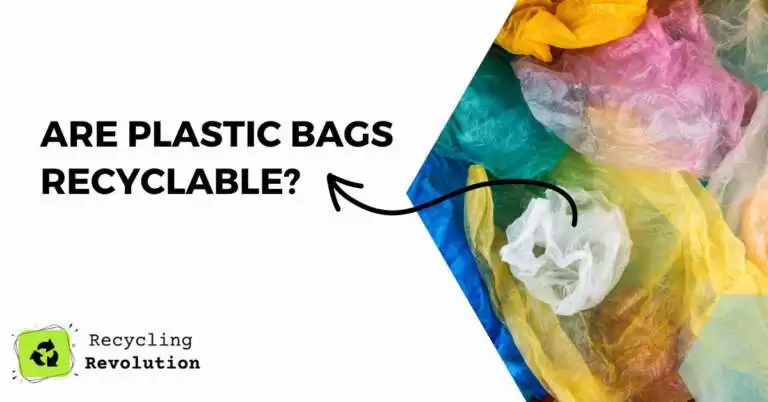The question “Are plastic bags recyclable?” may seem straightforward, but the answer isn’t as simple as one might think. A variety of factors, such as the type of plastic used, local recycling capabilities, and the availability of recycling facilities can greatly impact whether or not a plastic bag can be recycled.
TL;DR: Although some types of plastic bags can be recycled, the majority aren’t typically accepted in standard curbside recycling programs. A more effective way to recycle plastic bags is by returning them to specified collection points. The long-term environmental effect of plastic bag usage is quite severe, contributing to pollution, ecosystem disruption, and climate change.
🧴 Plastic Recycling Estimator
🔍 Plastic Buyback Facts
Most buyback programs accept PET (water bottles), HDPE (detergent containers), and PP (caps, cups). Light plastics like bags and wrappers are harder to recycle, but containers and jugs are highly valued. Recycling plastic reduces landfill overflow and saves fossil fuels.
The Recycling Challenge
The material composition of plastic bags often poses significant challenges for recycling machinery. Most plastic bags are made of low-density polyethylene (LDPE), also known as plastic #4, which is lightweight and flexible but can cause operational issues at recycling facilities.
The thin, flexible nature of these bags means they can easily get tangled in the machinery, leading to costly breakdowns and maintenance.
Despite these hurdles, some plastic bags can indeed be recycled, but not through the regular recycling bin. I recommend taking them to grocery stores or retailers that have designated plastic bag collection bins. These businesses often have relationships with specialized recycling facilities capable of processing plastic bags.
Environmental Impact
In an effort to quantify the environmental effects of plastic bags, consider the following statistics. According to a study published in Science Advances, as of 2015, only 9% of all plastic waste ever produced has been recycled. This equates to around 6300 million metric tons of plastic waste, much of which ends up in landfills or the natural environment.
Non-recycled plastic bags not only occupy valuable landfill space but also contribute to broader environmental pollution. When improperly discarded, they often find their way into oceans, posing serious threats to marine life. As per a report by the Ellen MacArthur Foundation, it is estimated that by 2050, there could be more plastic than fish in the ocean by weight.
It might be worthwhile to consider that plastic bags also contribute to climate change. As they break down, they release potent greenhouse gases like methane and ethylene into the atmosphere.
Steps to Recycle Plastic Bags
To recycle plastic bags effectively, follow these steps:
- Clean the Bags: Make sure they are free from food residues or other contaminants.
- Dry the Bags: Wet bags can compromise the recycling process.
- Separate by Type: Not all plastic films are the same. Keep grocery bags separate from heavier plastic films such as bread bags or zip-top bags.
- Locate a Drop-off Point: Use online resources to find your nearest plastic bag recycling drop-off location. Many supermarkets and large retail stores provide this service.
Here’s the types of plastic bags
| Plastic Bag Type | Recyclability |
|---|---|
| High-Density Polyethylene (HDPE) Bags | Widely accepted for recycling |
| Low-Density Polyethylene (LDPE) Bags | Not commonly accepted in curbside recycling programs, but some retailers have collection bins |
| Polypropylene (PP) Bags | Generally accepted for recycling |
| Polyethylene Terephthalate (PET) Bags | Not commonly accepted in curbside recycling programs, but some specialized facilities may accept them |
| Biodegradable or Compostable Bags | Require specific composting facilities; not suitable for regular recycling |
Consider The Alternatives
Given the complexities and environmental implications associated with plastic bag recycling, a useful suggestion would be to opt for alternatives. Reusable shopping bags made of cloth or heavy-duty plastic offer a sustainable choice. They are durable, capable of carrying more weight, and can be used repeatedly, reducing the overall demand for plastic bags.
In places where legislation has been passed to reduce single-use plastics, the use of paper bags has also increased. Though not a perfect solution (paper production also has environmental costs), paper bags are typically easier to recycle and can biodegrade much faster than plastic.
Conclusion
To answer the question “Are plastic bags recyclable?” – yes, they are, but it’s not as simple as tossing them into your home recycling bin. They require specialized recycling processes and dedicated collection points. However, the low recycling rates and high environmental costs associated with plasticbag use suggest we must focus more on reduction and reuse strategies.
Always remember, the most effective way to mitigate the environmental impact of plastic bags is to limit their use altogether. Whenever possible, I recommend using reusable bags for your shopping needs. If you do find yourself with a plastic bag, ensure it gets recycled appropriately to minimize its environmental footprint.
FAQ
Why can’t I put plastic bags in my curbside recycling bin?
Most curbside recycling programs are not equipped to handle plastic bags. They can get tangled in the machinery at recycling facilities, causing breakdowns and delays.
Where can I recycle plastic bags?
Many grocery stores and large retailers have collection points for plastic bags. These are often located at the front of the store.
Are biodegradable or compostable bags better alternatives?
Biodegradable or compostable bags can be a better choice, but they require specific conditions to break down effectively. They should be composted in industrial facilities, not in home composting systems.
How long does it take for a plastic bag to decompose in a landfill?
Plastic bags can take anywhere from 10 to 1,000 years to decompose in a landfill, depending on conditions. They break down into microplastics, tiny particles that can contaminate soil and water.
What’s the most environmentally friendly alternative to plastic bags?
The most environmentally friendly choice is a reusable bag that you can use many times over. Consider bags made from natural fibers like cotton, which have a lower environmental impact.

